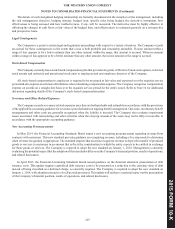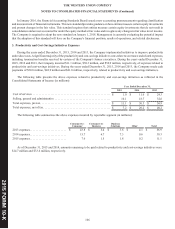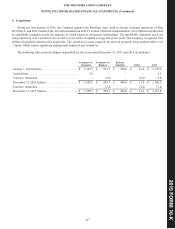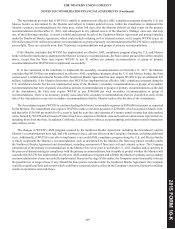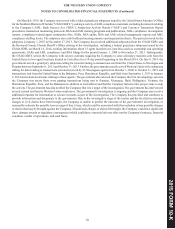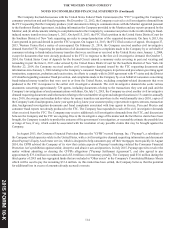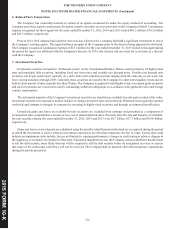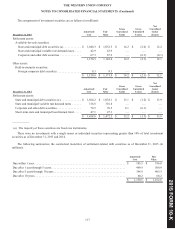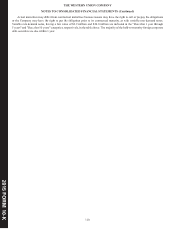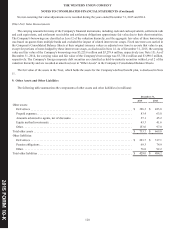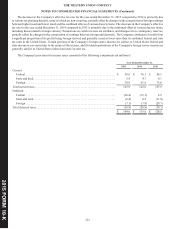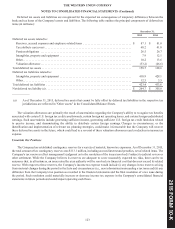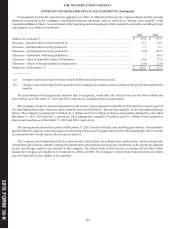Western Union 2015 Annual Report Download - page 216
Download and view the complete annual report
Please find page 216 of the 2015 Western Union annual report below. You can navigate through the pages in the report by either clicking on the pages listed below, or by using the keyword search tool below to find specific information within the annual report.
THE WESTERN UNION COMPANY
NOTES TO CONSOLIDATED FINANCIAL STATEMENTS (Continued)
114
The Company has had discussions with the United States Federal Trade Commission (the "FTC") regarding the Company's
consumer protection and anti-fraud programs. On December 12, 2012, the Company received a civil investigative demand from
the FTC requesting that the Company produce (i) all documents relating to communications with the Monitor appointed pursuant
to the Southwest Border Agreement, including information the Company provided to the Monitor and any reports prepared by the
Monitor; and (ii) all documents relating to complaints made to the Company by consumers anywhere in the world relating to fraud-
induced money transfers since January 1, 2011. On April 15, 2013, the FTC filed a petition in the United States District Court for
the Southern District of New York requesting an order to compel production of the requested documents. On June 6, 2013, the
Court granted in part and denied in part the FTC's request. On August 14, 2013, the FTC filed a notice of appeal. On August 27,
2013, Western Union filed a notice of cross-appeal. On February 21, 2014, the Company received another civil investigative
demand from the FTC requesting the production of all documents relating to complaints made to the Company by or on behalf of
consumers relating to fraud-induced money transfers that were sent from or received in the United States since January 1, 2004,
except for documents that were already produced to the FTC in response to the first civil investigative demand. On October 7,
2014, the United States Court of Appeals for the Second Circuit entered a summary order reversing in part and vacating and
remanding in part the June 6, 2013 order entered by the United States District Court for the Southern District of New York. On
October 22, 2014, the Company received another civil investigative demand issued by the FTC requesting documents and
information since January 1, 2004 relating to the Company’s consumer fraud program, its policies and procedures governing agent
termination, suspension, probation and reactivation, its efforts to comply with its 2005 agreement with 47 states and the District
of Columbia regarding consumer fraud prevention, and complaints made to the Company by or on behalf of consumers concerning
fraud-induced money transfers that were sent to or from the United States, excluding complaint-related documents that were
produced to the FTC in response to the earlier civil investigative demands. The civil investigative demand also seeks various
documents concerning approximately 720 agents, including documents relating to the transactions they sent and paid and the
Company’s investigations of and communications with them. On July 31, 2015, the Company received another civil investigative
demand requesting documents and information relating to the total number of agent and subagent locations in 13 countries annually
since 2010, the average and median dollar values for money transfers sent anywhere in the world annually since 2010, copies of
the Company’s anti-fraud programs, know your agent policy, know your customer policy, representative agent contracts, transaction
data, background investigation documents and fraud complaints associated with four agents in Greece, Peru and Mexico and
consumer fraud reports not already produced to the FTC. The Company has responded to each of the civil investigative demands
it has received from the FTC. The Company may receive additional civil investigative demands from the FTC, and discussions
between the Company and the FTC are ongoing. Due to the investigative stage of the matter and the fact that no claims have been
brought, the Company is unable to predict the outcome of the government’s investigation, or reasonably estimate the possible loss
or range of loss, if any, which could be associated with the resolution of any possible claims that may be brought against the
Company.
In August 2013, the Consumer Financial Protection Bureau (the "CFPB") served Paymap, Inc. ("Paymap"), a subsidiary of
the Company which operates solely in the United States, with a civil investigative demand requesting information and documents
about Paymap’s Equity Accelerator service, which is designed to help consumers pay off their mortgages more quickly. In August
2014, the CFPB advised the Company of its view that certain aspects of Paymap’s marketing violated the Consumer Financial
Protection Act’s prohibition against unfair, deceptive and abusive acts and practices. In July 2015, Paymap agreed to resolve the
matter without admitting or denying the CFPB's allegations ("Paymap Settlement Agreement"), and also agreed to pay
approximately $33.4 million in restitution and a $5.0 million civil monetary penalty. The Company paid $5.0 million during the
third quarter of 2015 and has segregated funds that are included in "Other assets" in the Company's Consolidated Balance Sheets
which will be used to pay the remaining $33.4 million. As this matter has been settled, the Company believes that the potential
for additional loss in excess of amounts already accrued is remote.
201 FORM 10-K
5



